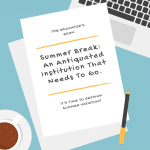As a teacher, we can get overwhelmed fast. In the midst of being tired, irritable, and frustrated, we can say some destructive words to ourselves, and if we’re not careful, to our students as well.
Here are three phrases you should try to stay away from this school year.
“Is it summer vacation yet?”
I’m sure you enjoyed your #TERSchoolFreeSummer. You deserved every luxurious nap, vacation, snack, and anything else you decided to do or not do.
But summer break is over. We knew the time would come when we would walk back through those doors and into our classrooms to set it up for our next set of students. We know the moments are coming when we just want to hide in a closet or in our car and scream. I can assure you that once or twice this year, you may slam your door, curse in your head (hopefully), or call in sick because you just can’t deal.
But when we start hoping and wishing for summer to show up, that shows that we’ve lost interest in the work between now and summer break. We’re trying our best to speed it up.
There was a time I was so frustrated with my students that I created a post-it note calendar and began ripping the days off the wall when the day was finally over. I couldn’t wait to get to the last day. But when I looked back, I realized I was so focused on getting to the summer that I didn’t stop to enjoy the moments of growth and understanding that my kids were having in the classroom.
“If you don’t want to be here, then stay home.” “If you don’t want to learn, stay at home.”
I won’t lie; I am notorious for this phrase.
I’ve had many occurrences where students are talking while I’m trying to explain a concept or give information about an exam that I know students will have a million questions. Sometimes, students just do not want to do their work or participate.
It is so annoying. Even though we’re not supposed to, we take it personal. To us, it means they don’t appreciate us or our time…and you don’t waste a teacher’s time.
So when this happens, we’re quick to tell them to stay at home. We tell them they’re wasting our time and their time.
But, we don’t think about the other reasons they come to school that extends beyond our teaching.
To eat. To be safe. To have a positive, healthy, and innocent relationship with an adult. To hear the one positive thing that helps them to hold on until the next day.
So the next time a kid is talking during your lesson, I dare you to find three things you can say or do before telling a child to stay home and not come to the one place they NEED to be every day.
“I don’t want him/her in my class. Can someone come and get him/her? I don’t want him/her here.”
Even when we think students aren’t listening, they’re listening loud and clear.
We don’t always know what’s happening at home. We don’t know who’s saying what to our students. They could be going home to a loving family who takes care of them and speaks to them sweetly, or they’re going to home to a family that says the same thing, “I don’t want you.”
Rejection is a deep hurt that many of us have experienced, from parents, family members, or even the teacher. Words hurt. They cut deep. Even if we mean them only on a surface level, students can take those words around with them for the rest of their lives. The feeling of not being wanted brings up moments of hopelessness and a lack of purpose and reason for being alive, which can lead to some dangerous areas in their lives.
Even in moments of frustration, we cannot speak words that our students will have to recover from as an adult.
I know our classrooms can get crazy from time to time. But instead of trying to create an entire scenario that lasts for months, let’s focus on the temporary situation of the here and now. Then, wake up every day to a new start, new grace, and new possibilities.
As a teacher, your words mean more than you know. Treat them as such.






